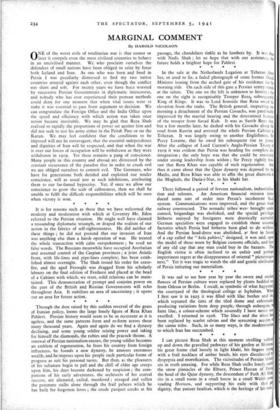MARGINAL COMMENT
By HAROLD NICOLSON
nNE of the worst evils of totalitarian war is that sooner or X./later it compels even the most civilised countries to behave in an uncivilised manner. We who proclaim ourselves the defenders of small nations have been obliged to seize by force both Iceland and Iran. As one who was born and bred in Persia I was peculiarly distressed to find my two native countries arrayed against each other, even though the conflict was short and soft. For twenty years we have been worsted by successive Persian Governments in diplomatic intercourse, and nobody who has ever experienced their protean methods could deny for one moment that when vital issues were at stake it was essential to pass from argument to decision. We can congratulate the Foreign Office and the India Office upon the speed and efficiency with which action was taken once action became inevitable. We may be glad that Reza Shah realised so rapidly the proportions of power set against him and did not seek to test his army either in the Peitak Pass or on the Karun. We may feel confident that the conditions to be imposed will not be extravagant, that the essential independence and dignities of Iran will be respected, and that when the war is over our forces of occupation will be withdrawn as they were withdrawn in 1919. Yet there remains a pang of conscience. Many people in this country and abroad are distressed by the constant recurrence of the paradox that in order to crush evil we are obliged ourselves to commit evil. The Germans, who have for generations both derided and exploited our tender conscience, will as usual jeer at such inhibitions, attributing them to our far-famed hypocrisy. Yet, if once we allow our conscience to grow the scab of callousness, then we shall be unable to fulfil the difficult responsibilities which will be ours when victory is won.


























 Previous page
Previous page